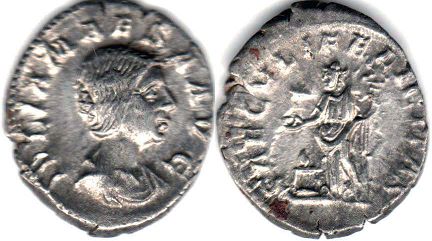Coins of Julia Maesa - catalog with values
Roman Empress (?-223)
Grandmother of Elagabal and Alexander Severus.

IVLIA MAESA AVG
SAECVLI FELICITAS
denarius 218-222
silver
20 mm.
Rome
Draped bust right / Julia Maesa Augusta
Felicitas standing left, sacrifices on the altar, in the left hand caduceus / The Age of Happiness
Coin value ~ US$60-80
Costs of Julia Maesa coins in this catalog approximate and indicated specifically for the coin shown in the picture.
I do not buy or sell coins - this is just a catalog.
See other coins of Imperial Rome.

